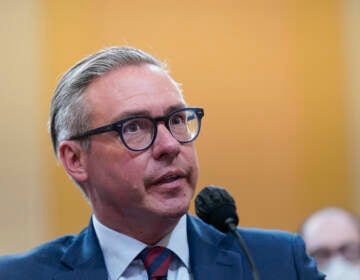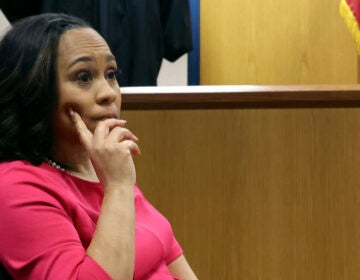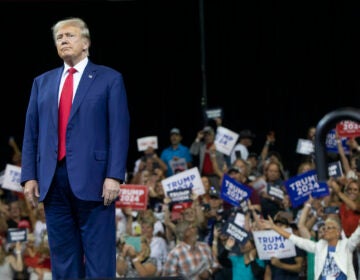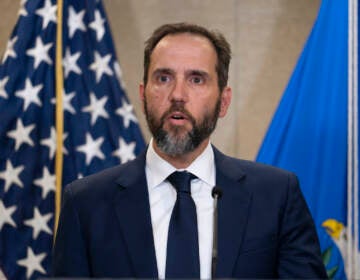Georgia special grand jury ends probe of Trump, 2020 election
The judge overseeing the panel issued an order Monday dissolving the special grand jury.
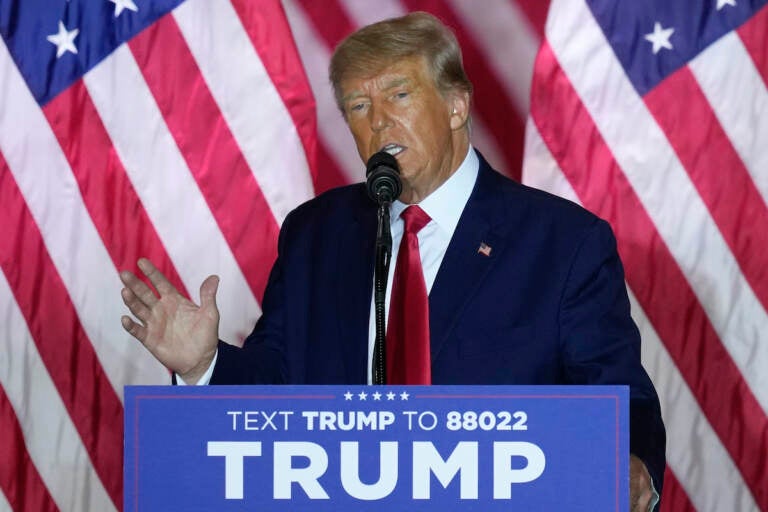
File photo: Former President Donald Trump speaks as he announces a third run for president, at Mar-a-Lago in Palm Beach, Fla., Nov. 15, 2022. (AP Photo/Rebecca Blackwell, File)
The special grand jury in Atlanta that has been investigating whether then-President Donald Trump and his allies committed any crimes while trying to overturn his 2020 election loss in Georgia has finished its work, bringing the case closer to possible criminal charges against Trump and others.
Fulton County Superior Court Judge Robert McBurney, who was overseeing the panel, issued a two-page order Monday dissolving the special grand jury, saying it had completed its work and submitted a final report. The lengthy investigation has been one of several around the country that threaten legal peril for Trump as he mounts a third bid for the White House.
The decision whether to seek an indictment from a regular grand jury will be up to Fulton County District Attorney Fani Willis. Willis spokesperson Jeff DiSantis said the office had no comment on the completion of the panel’s work.
McBurney wrote in his order that the special grand jury recommended that its report be made public. He scheduled a hearing for Jan. 24 to determine whether all or part of the report should be released and said the district attorney’s office and news outlets would be given an opportunity to make arguments at that hearing.
Since June, the special grand jury has heard testimony from dozens of witnesses, including numerous close Trump associates such as the former New York mayor and Trump attorney Rudy Giuliani andSen. Lindsey Graham of South Carolina. Assorted high-ranking Georgia officials have also testified, among them Gov. Brian Kemp and Secretary of State Brad Raffensperger.
Last month, the House committee investigating the Jan. 6, 2021, insurrection asserted in its final report that Trump criminally engaged in a “multi-part conspiracy” to overturn the lawful results of the 2020 presidential election and failed to act to stop his supporters from attacking the Capitol. The report concluded an extraordinary 18-month investigation into the former president and the violent attack.
Special grand juries in Georgia cannot issue indictments but instead can issue a final report recommending actions to be taken.
Willis opened the investigation in early 2021, shortly after a recording surfaced of a Jan. 2, 2021, phone call between Trump and Raffensperger. During that call, the president suggested the state’s top elections official could “find” the votes needed to overturn his loss in the state.
“I just want to find 11,780 votes, which is one more than we have,” Trump had said. “Because we won the state.”
Since then it has become clear that Willis has been focusing on several different areas: phone calls made to Georgia officials by Trump and his allies; false statements made by Trump associates before Georgia legislative committees; a panel of 16 Republicans who signed a certificate falsely stating that Trump had won the state and that they were the state’s “duly elected and qualified” electors; the abrupt resignation of the U.S. attorney in Atlanta in January 2021; alleged attempts to pressure a Fulton County election worker; and a breach of election equipment in a rural south Georgia county.
Lawyers for Giuliani confirmed in August that prosecutors told them he could possibly face criminal charges in the case. The 16 Republican fake electors have also been told they are targets of the investigation, according to public court filings. It is possible that others have also been notified they are targets of the investigation.
Trump and his allies have consistently denied any wrongdoing, with the former president repeatedly describing his call with Raffensperger as “perfect” and dismissing Willis’ investigation as a “strictly political Witch Hunt!”
Willis took the unusual step in January 2022 of requesting that a special grand jury be seated to aid the investigation. She noted that a special grand jury would have subpoena power which would help compel testimony from witnesses who were otherwise unwilling to participate in the investigation.
In a letter asking the court to impanel the special grand jury, Willis wrote that her office had received information indicating a “reasonable probability” that Georgia’s 2020 election, including the presidential race, “was subject to possible criminal disruptions.” Her request was granted and the special grand jury was seated in May.
The Justice Department has also been conducting a wide-ranging investigation into efforts to undo the results of the 2020 election, as well as into the fundraising practices of Trump’s political action committee.
On Monday, a person familiar with the matter who insisted on anonymity to discuss an ongoing investigation, said Giuliani had received a subpoena weeks ago that sought, among other things, information about possible retainer agreements with Trump and sources of money he had received. As a lawyer for Trump, Giuliani was involved in post-election efforts to challenge the results of the presidential contest.
CNN earlier reported the subpoena.
_____
Associated Press writer Eric Tucker in Washington contributed to this report.
Since then it has become clear that Willis has been focusing on several different areas: phone calls made to Georgia officials by Trump and his allies; false statements made by Trump associates before Georgia legislative committees; a panel of 16 Republicans who signed a certificate falsely stating that Trump had won the state and that they were the state’s “duly elected and qualified” electors; the abrupt resignation of the U.S. attorney in Atlanta in January 2021; alleged attempts to pressure a Fulton County election worker; and a breach of election equipment in a rural south Georgia county.
Lawyers for Giuliani confirmed in August that prosecutors told them he could possibly face criminal charges in the case. The 16 Republican fake electors have also been told they are targets of the investigation, according to public court filings. It is possible that others have also been notified they are targets of the investigation.
Trump and his allies have consistently denied any wrongdoing, with the former president repeatedly describing his call with Raffensperger as “perfect” and dismissing Willis’ investigation as a “strictly political Witch Hunt!”
Willis took the unusual step in January 2022 of requesting that a special grand jury be seated to aid the investigation. She noted that a special grand jury would have subpoena power which would help compel testimony from witnesses who were otherwise unwilling to participate in the investigation.
In a letter asking the court to impanel the special grand jury, Willis wrote that her office had received information indicating a “reasonable probability” that Georgia’s 2020 election, including the presidential race, “was subject to possible criminal disruptions.” Her request was granted and the special grand jury was seated in May.
WHYY is your source for fact-based, in-depth journalism and information. As a nonprofit organization, we rely on financial support from readers like you. Please give today.



